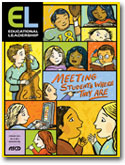My public life began my junior year in high school.
I had a frustrating stutter. I was embarrassed to speak in public, and my self-consciousness made my stutter worse. It was frustrating because my speech was fluid when I talked to friends, but whenever a teacher called on me in class, my stutter was pronounced. I was a decent student and fairly popular with my classmates. Yet I became vocally paralyzed in the face of a teacher's question.
I'm grateful for the specialists who, throughout my childhood, coached me on how to work around my stutter by positioning my tongue in certain ways, using words with soft consonants to get started, and so on. But my frustrations remained. Throughout my first two years in high school, I found that most teachers honored an unspoken contract with me: I would stay on task and complete my assignments, and they would not put me on the spot by calling on me. This held true until I had Mr. Mattson for U.S. History.
No More Hidden Contract
Mr. Mattson—a handsome young teacher whom the students admired— taught through class discussion. He provoked students to share their perspectives on events in U.S. history. But he was the teacher I dreaded most because he refused to play the hidden contract game; instead, he frequently called on me in class.
I tried various strategies to get him to stop, such as sitting in the back row, avoiding his gaze, or feebly raising my hand while everyone else frantically waved theirs. My last resort was to misbehave so he would send me out of the room. None of these tactics worked. Why doesn't he leave me alone, I kept thinking.
One day, following a particularly painful response during which I became red in the face, Mr. Mattson asked me to stay after class. "Carl," he told me, "I want you to know that I will continue to call on you. I know it isn't easy for you, but no matter how long it takes, your classmates and I will wait until you have completed your thoughts because what you have to say is worth listening to."
Mr. Mattson's words made me realize that my stuttering didn't need to stop me from offering my ideas to the world and that I should no longer avoid speaking in class or other public settings. Shortly after that conversation, I ran for class treasurer, which required me to give a five-minute speech to 400 students. This was my first talk to a large audience. Although I stumbled once or twice, my teachers and classmates gave me a loud and long ovation, and many congratulated me afterward.
It would be nice to close this story by saying that from that moment with Mr. Mattson, I was cured of stuttering. But that isn't true. My stutter has lessened over the years, but it has persisted throughout my life to some degree. However, I did become a public speaker. I have taught hundreds of college students, led numerous meetings, and presented to conference audiences numbering in the hundreds and even thousands.
And I've been searching for Mr. Mattson to tell him that his caring refusal to leave me alone gave me the confidence I needed to go public.

